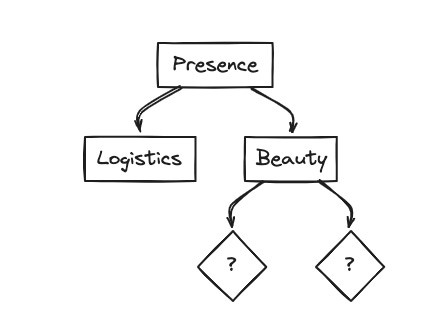Finding Beauty 🤩 in work
How do you find the corals hidden in our daily lives
In my previous article, Just breathing is not enough, I’d mentioned how presence has two key components - logistics and beauty.
The logistics part makes you feel more present by making you feel safe / secure and ensuring survival. The beauty part makes you feel more present by enabling you to have fun via discovery and playfulness. And while the pendulum keeps swinging between the two, you need both to completely belong to something.
Out of the two, beauty is harder to understand, so let’s delve there first.
There are some characteristics of beauty.
It’s often binary, it either exists or not.
However, being binary doesn’t mean that it’s not subjective. There’s an objective nature to it (e.g. exotic flowers are beautiful) but there’s also a subjective nature to it (e.g. I find this song to be beautiful).
How do you find beauty though?
Beauty starts with observation
.
I mean this in two ways:
You will not find something beautiful if you don’t notice it. The tree that you have been passing by everyday looked beautiful today because you truly noticed it.
Observation reveals the details about something. And those details often contribute to finding something beautiful.
Reality has a surprising amount of detail.
You take anything, natural or man-made, and you’ll find there’s so much to notice. If it’s a leaf, its color, shape, the veins as you look closely, they way it hangs from the stem, the way it moves with the wind and so on. If it’s a table, the way it’s constructed, its material, shape, imperfect edges, the noise it makes as it moves and so on.
If everything has so much detail, how come we don’t notice it?
Well, the discriminating factor here is our interest. You may not be interested in a table or leaf, and you may not notice the details. But whatever you’re interested in, there’s a chance you’ll find beauty in it.
Is interest a necessary or sufficient condition for beauty?
To answer this, we can look at beauty from two lenses —> first-time beauty and sustaining beauty.
You may not be interested in tall buildings and still find Burj Khalifa beautiful the first time you see it. However, to find it beautiful continuously, you do have to be interested in it to keep noticing the details.
That way, interest is a necessary condition for sustained beauty.
Interest alone may not be enough though.
In Zen and the Art of Motorcycle Maintenance, Robert Pirsig wrote:
Care and Quality are internal and external aspects of the same thing. A person who sees Quality and feels it as he works is a person who cares. A person who cares about what he sees and does is a person who’s bound to have some characteristic of quality
Care is the missing piece here. You may be interested in something, but if you don’t care about it, you may not find it beautiful for long.
This makes sense. If you care about something, you put efforts to study and/or improve it. That effort leads to a feeling of attachment, which makes something beautiful to you because there’s a part of you in it.
Care —> Effort —> Feeling of attachment —> Beauty
The reason interest and care are both important is that care alone may just be too serious. To find something beautiful, you also need to have a certain level of joy around it, that leads to a sort of happy meandering. Interest will provide the “What if we did this?” intent to explore, which will solve for this joy.
What’s the relationship between interest and care? Can interest lead to care? Yes.
A friend recently became a certified scuba diver, but along the way, he learnt so much about marine biology and threats to it, that he’s also now involved in coral conservation efforts.
So it’s possible, although the level of interest matters here. Mild interest may not lead to care, but obsessive interest could.
Interest —> Care1
This means, beauty is a function of how much you are interested and care about a topic. It’s not surprising now that Do what you love is such a cliche.
Is this beautiful?
Considering that beauty is crucial for peak performance and happiness, the lack of it would mean an absence of the two. So how do you know if you have found beauty in your work or not? (I’m using work as an example, but the same applies for other things as well).
I’d say the first answer to that question is you’ll know when you have found it. Just like love, value, devotion, happiness etc.
But for those of us with a less vociferous gut, some questions to ask to understand in this situation:
Would I still engage with this if I would not get anything out of it? No money, fame, validation etc
If this goes out of my life tomorrow, will I regret it?
Do I like talking about this endlessly to my close people?
Does the mention of this excite me?2
What these questions do is help you separate out your intrinsic motivation about something and then see if you are interested / care about the thing itself.
In the startup world, this translates to mission orientation or obsessive interest. Brian Chesky has been known of asking interviewees if they would still join Airbnb if they knew they were going to die in a year (later revised to 10 years). Pretty extreme but that (aims to) filter for people who’re truly interested in Airbnb.
There’s enough evidence that the best products out there were made with a level of obsession and care like no other. This also means the interest and care part don’t just make something beautiful for you, but also for the world (if you put it out there).
Wow, that seems like a great side-benefit :)
But ultimately, all of it starts from beauty. Figure out what you are interested in and care about a lot, and you’ll find it beautiful.
There’s a kind of care that comes from pure diligence which may not lead to beauty. E.g. If you’re doing something that is your role or responsibility but not out of your interest, you’d still care about it, but may not find it beautiful.
Btw, you can also use the same questions (with some tweaks) for people in your lives



